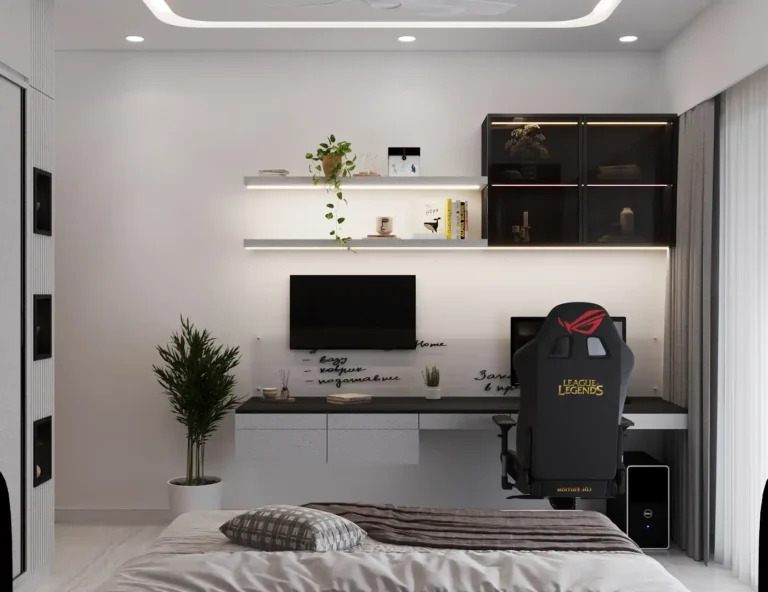Introduction
In today’s fast-paced world, a study room design is not just a place for work or study—it’s an environment that plays a crucial role in boosting focus, concentration, and productivity. Whether you are a student, professional, or someone who enjoys reading or personal projects, a well-designed study room can significantly impact your efficiency and motivation.
Creating a space that fosters creativity, organization, and calmness is essential for a productive study or work session. From color schemes and lighting to furniture and storage solutions, every element of your study room design should be carefully chosen to help you focus and perform at your best.
In this article, we will explore study room design ideas that enhance focus and productivity. We will also cover how to balance aesthetics with functionality, creating a space that inspires you to do your best work.
Why a Study Room Matters
A study room isn’t just about having a desk and a chair. The design of this space can influence how efficiently you work, how much you retain, and how comfortable you feel while engaging in academic or professional tasks. Here are some reasons why a study room is vital:
- Increased Productivity: A dedicated study space can help you separate work from leisure, improving focus and productivity.
- Enhanced Learning: The right environment can help your brain process and retain information better, leading to more efficient learning or task completion.
- Better Work-Life Balance: Having a designated study area allows you to create boundaries between your work and personal life, reducing stress and improving your overall well-being.
Key Elements of Study Room Design
When it comes to designing a study room that encourages focus and productivity, several factors need to be taken into consideration. Below are some key elements that can make a huge difference in your space.
1. Optimizing Layout and Space
The layout of your study room plays a critical role in how well you can work within the space. A clutter-free, well-organized room will help you concentrate better. Here are some layout ideas to consider:
- Desk Placement: The desk should be the focal point of the study room. Make sure it’s positioned in a way that allows you to work efficiently, with enough space to spread out materials and tools. Avoid placing the desk near windows with direct sunlight to prevent distractions.
- Seating Arrangement: A comfortable chair with proper lumbar support is essential for long hours of sitting. If you prefer, add a lounge chair or an extra seating area for brainstorming sessions or reading.
2. Choosing the Right Furniture
Selecting the right furniture is crucial for comfort and functionality. The furniture should not only complement the design of your room but also cater to your specific needs. Key pieces to consider:
- Ergonomic Desk Chair: An ergonomic chair helps maintain good posture, preventing discomfort and back pain during long hours of study or work.
- Adjustable Desk: If possible, opt for an adjustable desk that allows you to switch between sitting and standing. This feature promotes better posture and helps reduce strain from sitting for too long.
- Storage Solutions: Organize your study materials with appropriate storage solutions, such as bookshelves, filing cabinets, or drawers. Keeping your space tidy will prevent distractions and promote a calm atmosphere.
3. Lighting: Essential for Focus and Productivity
Proper lighting is one of the most important factors in a study room. Too little light can strain your eyes and hinder focus, while too much light can create glare and distractions. The right lighting will help you stay focused for longer periods without feeling fatigued.
- Natural Light: If possible, choose a study room with plenty of natural light. Natural light has been shown to improve concentration and mood. Try to position your desk near a window where you can enjoy the sunlight.
- Task Lighting: For those who study or work late, a good task light is essential. Desk lamps with adjustable brightness levels and angles allow you to focus light on specific areas, such as your study material.
4. Color Scheme: Influencing Focus and Mood
Colors can have a profound impact on mood and productivity. The right color scheme can either calm your mind or inspire creativity. When choosing colors for your study room, think about the following:
- Neutral Colors: Light tones such as whites, grays, and beige create a calm and peaceful atmosphere that promotes focus. These colors also help make small spaces feel more open.
- Blue: Blue is often associated with calmness and concentration. Lighter shades of blue can help reduce stress and increase focus, making it ideal for a study room.
- Green: Green represents growth and harmony, making it another great option for your study space. It can reduce anxiety and promote concentration, making it perfect for learning environments.
5. Incorporating Technology and Tools
Incorporating the right technology and tools in your study room can help streamline your workflow and make it easier to complete tasks efficiently. Consider the following:
- Computer or Laptop: Make sure your computer or laptop is ergonomically placed at eye level to avoid neck strain. An external keyboard and mouse can also improve comfort and productivity.
- Smart Devices: Integrate smart devices such as voice-controlled assistants, task timers, or smart lighting systems that adjust based on your preferences.
6. Personalizing Your Study Room
While functionality is essential, personalizing your study room will make the space feel inviting and comfortable. A room that reflects your personality can motivate you to work harder and improve your mood. Here are some ways to personalize your space:
- Artwork: Hang motivational artwork, abstract pieces, or calming landscapes that inspire you to stay focused and productive.
- Greenery: Add a few indoor plants to your study room. Plants not only purify the air but also help reduce stress and improve your concentration.
7. Sound Management for Better Focus
Sound can be both a help and a hindrance to productivity. Too much noise can be distracting, while complete silence may not always be ideal for everyone. Here’s how to manage sound in your study room:
- Soundproofing: If noise is a problem, consider soundproofing your study room. Install thick curtains, carpets, or acoustic panels to reduce external noise.
- White Noise or Music: Some people find that soft background music or white noise helps with concentration. Experiment with different sounds to see what works best for you.
How Luxury Interior Designers in Bangalore Can Enhance Your Study Room
For those seeking a sophisticated and stylish study room, collaborating with luxury interior designers in Bangalore can elevate your space to a new level. These professionals can offer customized design solutions that blend functionality with aesthetic appeal, creating a study room that meets your exact needs. Here’s how working with an interior designer can help:
- Tailored Designs: Luxury designers can create a personalized study space based on your preferences, lifestyle, and specific requirements.
- High-Quality Materials: Designers have access to premium materials and furnishings that can add luxury and durability to your study room.
- Innovative Concepts: A designer can offer innovative and creative ideas that you might not have considered, ensuring your study room is both functional and visually appealing.
Conclusion
A well-designed study room has the power to increase focus, enhance productivity, and foster a positive working environment. Whether you’re working, studying, or engaging in creative projects, every element of your study room—from the layout and furniture to the color scheme and lighting—should be carefully chosen to promote concentration and efficiency.
By incorporating the design ideas mentioned above and working with luxury interior designers in Bangalore, you can create a study space that not only boosts productivity but also inspires you to reach new heights of success. The key is to create a space that reflects your personality, meets your functional needs, and provides a serene and motivating atmosphere for all your study or work sessions.




